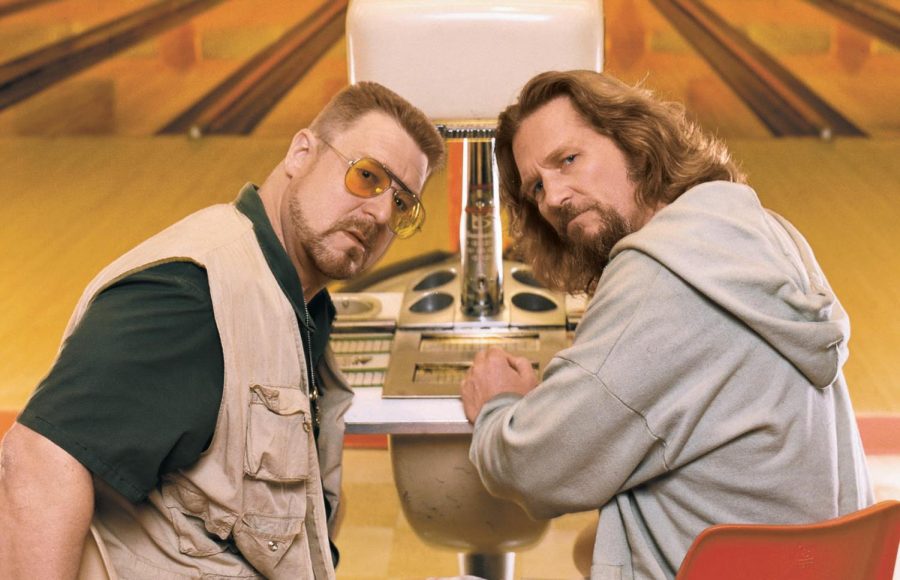20 Years of Soiled Rugs, Bowling and the Dude
Celebrating its 20th anniversary, “The Big Lebowski” continues to be a timeless cult classic loved by audiences.
Walter Sobchak (left), played by John Goodman, and Jeffrey Lebowski, played by Jeff Bridges, in “The Big Lebowski.” The movie came out 20 years ago.
September 21, 2018
Imagine this elevator pitch: a story about a jobless stoner whose rug is soiled, which sends him on a downward spiral into Los Angeles’ underbelly involving a millionaire, a group of nihilists and a pornographic film producer. No one would have predicted that a film centered around the cold-hearted befouling of one’s rug could be made, but it was. The result: arguably the Coen brothers’ finest work and the now culturally renowned picture known as “The Big Lebowski.”
When “The Big Lebowski” was first released in 1998, it was a box office flop. After the Coen brothers’ Oscar-winning success “Fargo,” audiences were expecting a more serious, defined story. Twenty years on, “The Big Lebowski” has garnered an ever-growing fanbase that has cemented its cultural prominence. For its 20th anniversary, the film plays at the IFC Center on Sept. 21 and 22 as part of the theater’s Late-Night Favorites series.
The film has no distinct plot; it just drifts from scene to scene like the mysterious cowboy called The Stranger (Sam Elliott), who introduces the audience to the Dude. The Dude is an aimless individual, and the lack of progression in “The Big Lebowski” captures that. He spends his unemployed days bowling, drinking White Russians and experiencing the “occasional acid flashback.” The Dude rejects the basic notion of storytelling that a character must change by the end of the narrative. His contentment with the status of his life is what makes him so easy to root for.
As with any great film, “The Big Lebowski” boasts an idiosyncratic and memorable band of characters. John Goodman plays Walter Sobchak, the Dude’s Vietnam-War-crazed friend and bowling partner, who’s a real stickler for the rules. They’re accompanied by Donny, portrayed by the always on-point Steve Buscemi, who is mostly silenced by Walter’s endless screams of “Shut the f—k up, Donny!” It would be a sin to forget Jesus Quintana; brought to life by John Turturro, Jesus is the Dude’s formidable bowling opponent who sports a snug purple jumpsuit and struts with cocky swagger. The rest of the impressive cast is rounded out by Julianne Moore, Philip Seymour Hoffman, Peter Stormare, Flea and Ben Gazzara.
“The Big Lebowski” is a rare sort of film where it seems that every line in the script was meant to be memorized and regurgitated for future pleasure. Every word is meticulously carved into the dialogue, and nothing is out of place. Thanks to the Coen brothers’ superb writing talent, we have phrases like “Yeah, well, you know, that’s just, like, your opinion, man” and “You want a toe? I can get you a toe. Believe me, there are ways, Dude.” It’s a substantial challenge to find a single line in the entire film that isn’t quotable, showing how much effort was put into devising a script that sounds effortless.
To begin to understand the reach of the film’s influence, look no further than Dudeism — the religion born out of the Dude’s principles. Their philosophy is a righteous one: “Just take it easy, man.” The religion boasts an impressive amount of literature for its dedicated followers, including “The Tao of the Dude” — a handbook to understanding philosophical quandaries using the practices of Dudeism. For those still unimpressed, one can get ordained as a Dudeist Minister, of which there are currently 350,000 around the world.
Its cultural significance persists throughout generations, even reaching students at NYU, many of whom were born the year the film was released. Tisch sophomore Mert Erenel considers the affable nature of the Dude.
“What you like about the Dude is that even if he never really did anything with his life and is probably not likely to anytime in the future, he stands more decent [and] honest than any of the other characters who are rich and successful,” Erenel said.
A cult film is a gift that keeps on giving. It harnesses its eccentric nature and lures viewers in to engulf themselves in the unconventional narrative. There are numerous elements of “The Big Lebowski” that necessitate it to be watched over and over again: the absurd plot (or lack of it), the surreal dream sequences and an array of characters who each contribute their own peculiarities. Most of all, it is the Dude who urges audiences to revisit the film 20 years after its release. His unflappable attitude and stress-free view of life are admirable, rare qualities — and we all just want to see him get his rug back.
“The Big Lebowski” plays at the IFC Center at 323 6th Ave. on Sept. 21 and 22.
Editor’s Note: Mert Erenel was a staff writer for WSN in the past.
Email Daniella Nichinson at [email protected].




























































































































































